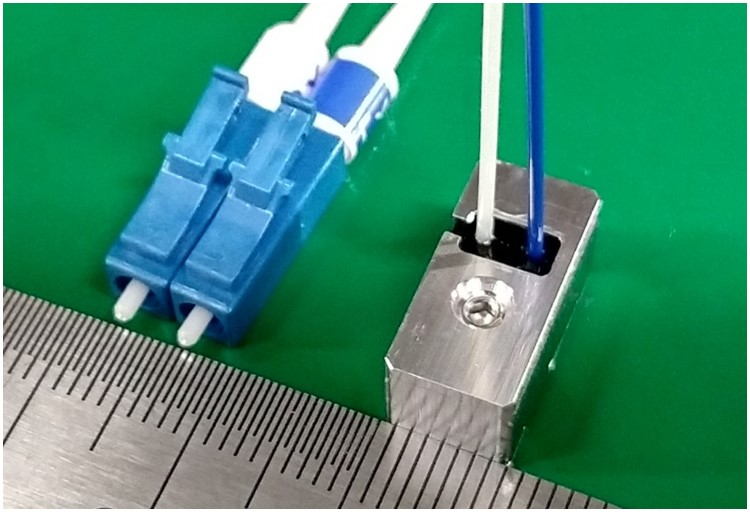Development of the World's Smallest CPO Transceiver Technology
News
September 24, 2024
Fujitsu Optical Components
Development of the World's Smallest CPO Transceiver Technology
Fujitsu Optical Components Limited (FOC) has developed a CPO transceiver technology that integrates VCSELs, MCFs, and electrical ICs in an ultra-compact and high-density manner by a commissioned research from National Institute of Information and Communications Technology (NICT). This technology enabled the 25-Gb/s × 16-channel CPO transceiver with a volume of less than 1 cm3, achieving the world's smallest size. The power consumption per bit is also at the lowest class, achieving 5 pJ/bit.
Details of this technology will be presented at the 50th European Conference on Optical Communication (ECOC 2024) held in Frankfurt, Germany from September 22, 2024. This presentation is the result of joint research with Furukawa Electric Co., Ltd. and Tokyo Institute of Technology.
【Conference】
50th European Conference on Optical Communication (ECOC 2024)
【Presentation】
Th2C.1: An Ultra-Compact CPO Transceiver based on 1060-nm Single-Mode VCSEL Array and Multi-Core Fibre
【Technology】
With the rapid growth of data center traffic, high-speed and high-capacity data transmission over short distances is becoming increasingly important. Optical interconnects using optical fibers play a crucial role in this application. In addition, data center power consumption is also a major concern, making it essential to transmit data with lower power consumption. To address these challenges, CPO (Co-Packaged Optics) transceivers, which are placed in close proximity to switch ASICs, becomes a key area of focus in the development of new optical transceiver designs.
FOC has developed a CPO transceiver technology that integrates 1060-nm coupled-cavity VCSELs (Vertical Cavity Surface Emitting Lasers), multi-core fibers (MCFs), and electrical ICs in an ultra-compact and high-density manner. This technology employs a novel packaging structure that utilizes double-sided flip-chip bonding for both VCSELs and electrical ICs. Applying this technology has enabled a 25-Gb/s × 16-channel CPO transceiver with a volume of less than 1 cm3, achieving the world's smallest size for a 400-Gb/s optical transceiver (Figure 1). By reducing electrical transmission power through a neighborhood placement to the switch, we achieved a low power consumption per bit of 5 pJ/bit, which is among the lowest in its class. The ultra-compact size of CPO transceivers enables high-density placement, expanding transmission capacity. Furthermore, spatial multiplexing with MCF can increase the transmission capacity per fiber by 16 times.

Fig.1 25-Gb/s × 16-channel ultra-compact CPO transceiver.
【Impact】
This technology can be applied to ultra-compact and low-power optical transceivers, which are expected to be in increasing demand in the future. In addition to contributing to the downsizing and power-reduction of switch equipment within data centers, this technology is expected to be applied to areas such as enhancing AI processing capabilities.
These research results were partially obtained from the commissioned research (J012368C00101, J012368C07901) by National Institute of Information and Communications Technology (NICT), Japan.
 The Sustainable Development Goals (SDGs) adopted by the United Nations in 2015 represent a set of common goals to be achieved worldwide by 2030. Fujitsu’s purpose — “to make the world more sustainable by building trust in society through innovation”—is a promise to contribute to the vision of a better future empowered by the SDGs.
The Sustainable Development Goals (SDGs) adopted by the United Nations in 2015 represent a set of common goals to be achieved worldwide by 2030. Fujitsu’s purpose — “to make the world more sustainable by building trust in society through innovation”—is a promise to contribute to the vision of a better future empowered by the SDGs.
Related Links
Trademarks
Company and product names used in this news are protected as the trademarks and proprietary product names of their respective companies
Contacts
Fujitsu Optical Components Limited
Sales & Marketing Div.
E-mail: foc-contact-pr@dl.jp.fujitsu.com
